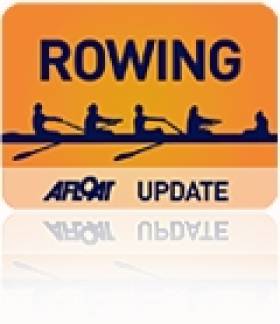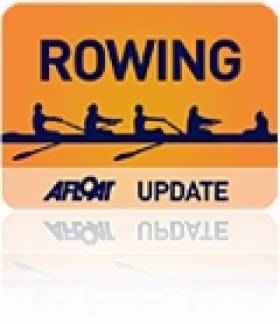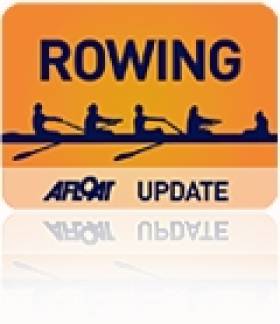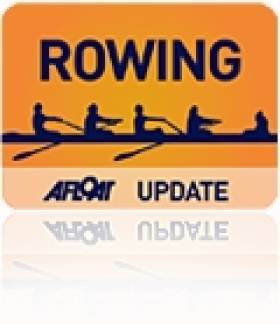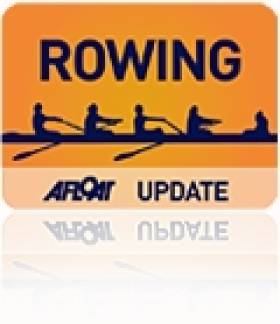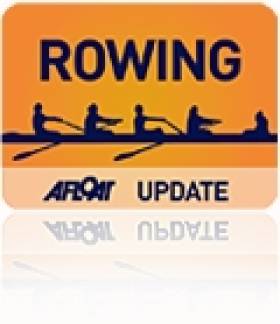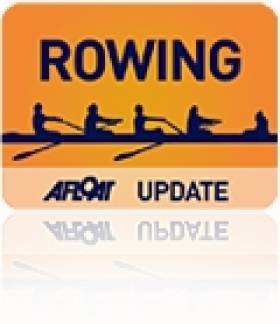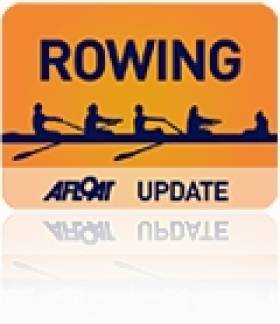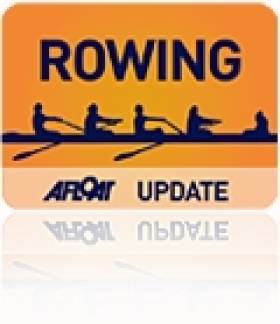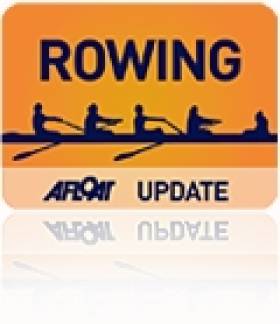Displaying items by tag: Rowing,
# ROWING: The Ireland team for the Home Countries International in Cardiff on July 21st includes Colm Dowling and Shane Mac Eoin from the Cork Boat Club four which competed in the Wyfold at Henley Royal Regatta. Tiernan Oliver of Queen’s University will compete in the men’s four and eight, though he came into the season a novice.
| ROWING IRELAND – HOME INTERNATIONAL REGATTA 2012 |
|---|
| SENIOR TEAM |
| SENIOR MEN |
| The following Senior Men have been selected to compete for Rowing Ireland at the Home International |
| Regatta 2012 |
| SENIOR MEN SCULLING |
| 1X Kevin Coughlan Carlow RC Coach |
| Paddy Behan Carlow RC |
| Lwt 1X Kevin O’Connor St. Michaels RC |
| 2x Cian Pidgeon Castleconnell RC |
| Michael Bailey Neptune RC |
| Lwt 2x Niall Murphy Carlow RC |
| Shane Byrne Carlow RC |
| 4x Kevin Coughlan Carlow RC |
| Kevin O’Connor St. Michaels RC |
| Cian Pidgeon Castleconnell RC |
| Michael Bailey Neptune RC |
| SENIOR MEN SWEEP |
| 2- Aidan McEvoy St. Michaels RC Coach |
| Mark O’Brien St. Michaels RC Jonathan Shinnors St. Michaels RC |
| Lwt 2- Paul Sweetman Commercial RC |
| Stephen Connolly Commercial RC |
| 4- Shane McEoin Cork BC |
| Colm Dowling Cork BC |
| Peter Gillanders Queens Uni BC |
| Tiernan Oliver Queens Uni BC |
| 4+ Richard Looney Lee RC |
| Padraic O’Connell Lee RC |
| Declan O’Connor Lee RC |
| Patrick Quinn St. Michaels RC |
| Gavin Connolly - Cox Commercial RC |
| 8+ Aidan McEvoy St. Michaels RC |
| Mark O’Brien St. Michaels RC |
| Shane McEoin Cork BC |
| Colm Dowling Cork BC |
| Peter Gillanders Queens Uni BC |
| Tiernan Oliver Queens Uni BC |
| Richard Looney Lee RC |
| Padraic O’Connell Lee RC |
| Gavin Connolly - Cox Commercial RC |
| The crews listed above are not listed in seat order in the boats |
| SENIOR WOMEN |
| The following Senior Women have been selected to compete for Rowing Ireland at the Home International |
| Regatta 2012 |
| SENIOR WOMEN SCULLING |
| 1X Monika Dukarska Killorglin RC Coach |
| John O’Keeffe Three Castles RC |
| Lwt 1X Karen Corcoran-O’Hare Shandon RC |
| 2x Helen Walshe Three Castles RC |
| Eimear Moran Three Castles RC |
| Lwt 2x Karen Corcoran-O’Hare Shandon RC |
| Saoirse Horgan Shandon RC |
| 4x Helen Walshe Three Castles RC |
| Eimear Moran Three Castles RC |
| Monika Dukarska Killorglin RC |
| Saoirse Horgan Shandon BC |
| SENIOR WOMEN SWEEP |
| 2- Jessica O’Keeffe St. Michaels RC Coach |
| Ailish Sheehan St. Michaels RC Martin Kilbane Cork BC |
| Lwt 2- Liz Gill St. Michaels RC |
| Fran Judge UCDLBC |
| 4- Anna Wickham Cork BC |
| Marie O’Neill Cork BC |
| Caroline Murray Commercial RC |
| Emer Nic Aiodh Commercial RC |
| 4+ Jessica O’Keeffe St. Michaels RC |
| Ailish Sheehan St. Michaels RC |
| Sheila Clavin St. Michaels RC |
| Orla McEvoy St. Michaels RC |
| Kirsten Joyce - Cox UCDLBC |
| 8+ Ailish Sheehan St. Michaels RC |
| Anna Wickham Cork BC |
| Marie O’Neill Cork BC |
| Caroline Murray Commercial RC |
| Emer Nic Aiodh Commercial RC |
| Sheila Clavin St. Michaels RC |
| Orla McEvoy St. Michaels RC |
| Alice O’Sullivan UL RC |
| Kirsten Joyce - Cox UCDLBC |
| The crews listed above are not listed in seat order in the boats |
Rob Roy End Cork's Run at Henley Royal Regatta
# ROWING: The Cork Boat Club four of John Paul Collins, Stephen Carroll, Colm Dowling and Shane Mac Eoin put in a good challenge in the second round of the Wyfold Cup but could not overcome Rob Roy from Cambridge at Henley Royal Regatta. The English crew led by half a length at the quarter mile and held off Cork’s pushes to extend their lead.
Colin Williamson of Queen’s University lost to El Salvador’s Roberto Lopez in the Diamond Sculls. Lopez powered away from Williamson early on and did not yield up the advantage.
Henley Royal Regatta, Day Two (Irish interest)
Wyfold Cup (Fours, Club): Rob Roy bt Cork BC 4¼ l, 7:53
Diamond Sculls (Single Sculls, Open): R Lopez (El Salvador) bt C Williamson (Queen’s University) easily, 9:00
# ROWING: Ireland’s only eight competing at Henley Royal Regatta bowed out of the Temple Cup today. Trinity led the University of Michigan at the Barrier and Fawley (roughly halfway). A push by Trinity was ineffective, but the Americans staged their own which took them into the lead. They took control and won by one and a quarter lengths.
Henley Royal Regatta, Day One (Irish interest)
Temple Cup (Eights, Student): University of Michigan (USA) bt Trinity 1 ¼ l, 7:12
Prince Albert Cup (Coxed Fours, Student): Imperial College bt Queen’s University 1¾ l, 8:07
Wyfold Cup (Fours, Club): Cork BC bt Cardiff City 1l, 7:52; Rob Roy bt Henley B 4l, 7:56
Cork Boat Club Win First Battle at Henley Royal Regatta
# ROWING: Cork Boat Club gave Ireland its first race win at Henley 2012, when they came through their first round test against Cardiff City in the Wyfold for club fours. The Cork crew eked out a lead early on, but Cardiff mounted a challenge right to the end when the pressure told and their steering faltered. Cork won by a length.
Imperial Boat Club, who were seeded, ousted Queen’s University in the Prince Albert for student coxed fours.
Henley Royal Regatta, Day One (Irish interest)
Temple Cup (Eights, Student): Brown University (USA) bt Dartmouth 2½ l, 6:57;
Prince Albert Cup (Coxed Fours, Student): Imperial College bt Queen’s University 1¾ l, 8:07
Wyfold Cup (Fours, Club): Cork BC bt Cardiff City 1l, 7:52; Rob Roy bt Henley B 4l, 7:56
Ireland Junior Rowing Team for World Championships Chosen
# ROWING; Four Ireland crews have been chosen to represent Ireland at junior level at the World Senior and Junior Championships in Plovdiv in Bulgaria in August. The men's single of Paul O'Donovan and the pair of Joel Cassells and Chris Black will be joined by Kate O'Brien in the junior women's single and a junior women's quadruple. The teams for the Coupe de la Jeunesse and the Home Internationals have also been picked.
| JUNIOR TEAMS |
|---|
| JUNIOR WORLD ROWING CHAMPIONSHIPS – PLOVDIV, BULGARIA |
| JM1X Paul O’Donovan (Skibbereen RC) |
| Coach: Teddy O’Donovan |
| JW 1x Kate O’Brien (St.Michael’s RC) |
| Coach : HP Team |
| JM2‐ Joel Cassells (Bann RC) |
| Chris Black (Bann RC) |
| Coach: Seamus Reynolds |
| JW4X‐ Bridget Jacques (Belfast Boat Club) |
| Hilary Shinnick (Fermoy RC) |
| Katie Cromie (Portora BC) |
| Bernadette Walsh (Skibbereen RC ) |
| Coaches: Derek Holland , Nathan Adams |
| Team Manager: Martin McElroy |
| Lead Coach : Derek Holland |
| Details regarding the Junior World Rowing Championships can be found at |
| http://www.worldrowing.com/events/2012‐world‐rowing‐senior‐and‐juniorchampionships |
| COUPE DE LA JEUNESSE – BANYOLES, SPAIN |
| JM4‐ Henry Millar (Portora BC) |
| Lloyd Seaman (Portora BC) |
| Finnion Tolan (St. Joseph’s RC) |
| James Egan (St. Joseph’s RC) |
| Coaches: Derek Holland , David Ewart |
| JM2X Andrew Griffin (Neptune RC) |
| David Quinlan (Castleconnell BC) |
| Coaches: John Holland |
| JM4X Aodhan Burns (Skibbereen RC) |
| John Mitchell (Lee RC) |
| Jack Casey (Shandon BC) |
| Paddy Hegarty (Skibbereen RC) |
| Coaches: John Holland , Teddy O’Donovan |
| JW4x Aileen Crowley (Muckross RC) |
| Lucie Litvack (Belfast Boat Club) |
| Sarah Allen (Bann RC) |
| Sarah Higgins (Cork BC) |
| Coach: Nathan Adams |
| JW2‐ Brooke Edgar (Bann RC) |
| Aoife Cooper (Muckross RC) |
| Coach: Seamus Reynolds |
| Team Manager: Clare Cox |
| Lead Coach: Derek Holland |
| Details regarding the Coupe de la Jeunesse can be found at |
| http://www.cebanyoles.cat/en‐us/competicio/rem2012/inici.aspx |
| http://www.couperowing.org/ |
| HOME COUNTRIES REGATTA |
| JM4‐ / JM 8+ William Yeomans (Commercial RC) |
| Colm O’Riada (Commercial RC) |
| Gary Thornton (Portora BC) |
| Chris Alcorn (Bann RC) |
| JM4+/ JM8+ Eric McEvoy (St.Josephs RC) |
| Aiden Kinneen (St.Josephs RC) |
| Kevin Keohane (Presentation College) |
| Niall Crowley (Presentation College) |
| JM2‐ Shane Walsh (Galway RC) |
| Alan Murtagh (Galway RC) |
| Colm Connelly – Cox (St. Joseph’s RC) |
| Coaches: John Walsh, Jamie Bradley |
| JM4X‐ Matthew Ryan (Skibbereen RC) |
| Andy Harrington (Shandon RC) |
| Daniel Buckley (Lee RC) |
| Paudie Leonard (Skibbereen RC) |
| Coach : David O’Donovan |
| JM2X Andrew Bell (Colaiste Iognaid) |
| Patrick Boomer (Methodist College ) |
| JM1X David O’Malley (St.Michaels’s RC) |
| Coach: James Boomer |
| JW4‐ / JW8+ Ruth Gilligan (Shannon RC) |
| Lauren McHugh (Shannon RC) |
| Ruth Cummins (Galway RC) |
| Kellie Wade (Galway RC) |
| JW4+ / JW8+ Hanna McCarthy (St.Michael’s RC) |
| Hanna O’Sullivan (St.Michael’s RC) |
| Emily Hutchinson (Bann RC) |
| Fiona Murtagh (Galway RC) |
| JW2‐ Kara O’Connor (Muckross RC) |
| Jasmine English (Methodist College) |
| Affric O’Regan Cox (Galway RC) |
| Coach: Iain Cumiskey, Michael O’Callaghan |
| JW 4x Leonie Hamel (Cork BC) |
| Megan McLaughlin (Cork BC) |
| Rosin Merz (Shandon RC) |
| Laura Coleman (Shandon BC) |
| Coach: David O’Donovan |
| JW 2x Kathrine Cremin (Muckross RC) |
| Sadbh Cassidy (Neptune RC) |
| JW 1x Ella Ciallis (Skibbereen RC) |
| Coach: Cathal Moynihan |
| Team manager: Lisa O’Callaghan |
Skibbereen Win eFlow Grand League Rowing Series
#ROWING: Skibbereen Rowing Club are the eFlow Go Row League champions of 2012. The west Cork club amassed 466 points over the three rounds and won Division One for men and for women.
All three regattas which hosted the eFlow League had huge entries. Skibbereen Rowing Club held the first regatta of the series at the National Rowing Centre in April and had 560 entries, becoming the biggest one-day regatta ever held in Ireland. Queen’s University staged the second round at Castlewellan and Cork Regatta at the NRC last weekend was the final in the series. Metropolitan Regatta at Blessington Lakes, which would have been the third round, had to be cancelled because of high winds.
“We’re very pleased to have won,” said Dominic Casey, the head coach of Skibbereen. “I think the league is good for rowing. The entry speaks for itself.”
There are prizes of €400 for each division winner and €400 to the overall points leader.
Casey’s club was taking its third League title in succession. This season they were pushed hard by Queen’s University in the men’s class (192 points to 172), while Three Castles, who are based at Blessington, were second in women’s Division One. Lee won men’s Division Two and Commercial of Dublin took women’s Division Two.
eFlow Go Row League 2012
Overall: 1 Skibbereen RC 466, 2 Lee RC 303, 3 St Michael’s RC 296, 4 Cork BC 270, 5 UCD BC 267, 6 NUIG BC 259, 7 Queen’s BC 255, 8 Dublin University BC 208, 9 Commercial RC 208, 10 Shandon BC 204.
Men – Division One: 1 Skibbereen 192, 2 Queen’s 172, 3 NUIG 114, 4 St Michael’s 89, 5 Bann 73, 6 Cork 59. Division Two: 1 Lee 225, 2 Queen’s 83, 3 Skibbereen 77.
Women – Division One: 1 Skibbereen 188, 2 Three Castles RC 139, 3 St Michael’s 119, 4 Queen’s LBC 88, 5 Cork 86, 6 NUIG 74. Division Two: 1 Commercial 109, 2 Queen’s LBC 88, 3 Dublin University LBC 76.
Grainne Mhaol/NUIG Best Eight at Cork Rowing Regatta
#ROWING: Galway crews came out on top in Division One of the men’s eights at Cork Regatta at the National Rowing Centre in Cork. The Grainne Mhaol/NUIG senior eight overcame NUIG’s intermediate eight, with the St Joseph’s junior crew third.
Helen Walshe and Eimear Moran of Three Castles added the Division One doubles title to the singles title Walshe had won the previous night.
Men, Eight – Division One – A Final: 1 Grainne Mhaol/NUIG (senior) 6:19.4, 2 NUIG (intermediate) 6:23.7, 3 St Joseph’s (junior 18A) 6:33.3; 4 UCD (inter) 6:38.9, 5 Galway (jun 18A) 6:40.9. B Final: Neptune (jun 18A) 6:50.8. Division Two: 1 Trinity (nov) 6:19.4, 2 UCD (nov) 6:19.7, 3 Neptune (jun 16) 6:25.9.
Four – Division One: 1 Grainne Maol (sen) 6:20.3, 2 Cork (sen) 6:24.3, 3 St Michael’s (sen) 6:27.3; 4 NUIG (u-23) 6:55.5.
Four, coxed – Division One – A Final: 1 UCD (inter) 6:37.8, 2 NUIG (inter) 6:40.2, 3 Portora (jun 18A) 6:49.1. B Final: St Michael’s (jun 18A) 6:48.3. Division Two, coxed – A Final: 1 Trinity (nov) 7:22.4, 2 UCC (nov) 7:23.7, 3 UCD (nov) 7:27.5. B Final: 1 NUIG (nov) 7:42.6; 2 Cork (jun 16) 7:44.2.
Sculling, Quadruple – Division One – A Final: 1 Skibbereen (sen) 6:40.5, 2 Skibbereen (jun 18A) 6:45.2, 3 Carlow (sen) 6:48.5. B Final: NUIG (inter) 7:13.1.
Division Two, coxed – A Final: 1 Shandon (nov) 7:15.6, 2 Neptune (nov) 7:16.2, 3 Commercial (jun 16) 7:31.8. B Final: Shandon (jun 18B) 7:43.6.
Double – Division One – A Final: 1 Neptune (inter) 7:06.9, 2 UCD (sen) 7:07.7, 3 Castleconnell (u-23) 7:09.8; 5 Skibbereen (jun 18A) 7:28.4. B Final: Skibbereeen (inter) 7:11.1. C Final: Garda (inter) 7:13.8. Division Two – A Final: 1 Cappoquin (nov) 7:33.8, 2 Skibbereen (nov) 7:36.8, 3 Lee (Jun 18B) 7:46.0. B Final: 1 Shannon (jun 18B) 7:51.6; 2 Athlone (jun 16) 7:54.6. C Final: Shandon (jun 18B) 8:17.0.
Single - Division Two: 1 Skibbereen (O’Neill, nov) 7:47.3, 2 Cork A (Burgess, jun 18B) 8:00.6, 3 Neptune (McCarthy, nov) 8:03.2. B Final: Shannon (Carmody; jun 16) 7:55.6; C Final: Cork D (Murphy; jun 16) 7:56.9. Masters: Clonmel (Kinsella).
Women
Eight – Division One: 1 Trinity (u-23) 6:41.4, 2 Galway (jun 18A) 6:47.3, 3 St Michael’s (inter) 6:52.1; 4 Skibbereen (u-23) 6:56.5, 5 NUIG (inter) 7:05.6. Division Two: 1 Trinity (nov) 7:39.5, 2 NUIG (Nov) 7:52.9, 3 Cork (nov) 8:00.6; 5 Shannon (jun 16) 8:27.1, 6 Shandon (jun 18B) 8:30.8.
Four – Division One - A Final: 1 Skibbereen (sen) 7:42.2, 2 Cork (sen) 7:47.3, 3 NUIG (sen) 7:55.0; 4 St Michael’s (jun 18A) 8:07.3. B Final: 1 Galway (jun 18A) 8:04.0.
Four, coxed - Division One: 1 Trinity (inter) 7:37.6, 2 University of Limerick (inter) 7:46.2, 3 Commercial (inter) 7:47.8. Division Two: 1 Trinity (nov) 7:46.0, 2 University of Limerick 7:46.2, 3 NUIG (nov) 7:56.9. B Final: Trinity B 8:07.1.
Sculling, Quadruple – Division One: 1 Skibbereen (sen) 7:06.3, 2 Shandon (jun 18A) 7:10.3, 3 Cork (jun 18A) 7:10.3. Division Two, coxed – A Final: 1 Carlow (jun 16) 7:38.8, 2 Galway (jun 16) 7:41.3. B Final: 1 Commercial (jun 16) 7:55.6; 4 Muckross (jun 18B) 8:47.7; 5 Commercial (nov) 9:20.3.
Double – Division One – A Final: 1 Three Castles (sen) 7:14.3, 2 Skibbereen (under-23) 7:39.1, 3 Skibbereen (u-23) 7:42.6. B Final: Neptune (jun 18) 7:53.4. C Final: Clonmel B (jun 18A) 8:22.1.
Single – Division Two – A Final: 1 Shandon (Callnan, jun 18B) 9:16.1, 2 St Michael’s B (Madden; jun 18B) 9:26.8, 3 Fermoy (Sohun; jun 16) 9:33.4. B Final: 1 Muckross (Cremin; jun 16) 9:23.3; 2 University of Limerick (Kearney; novice) 9:29.4. C Final: Fermoy (Freeman; jun 16) 9:25.6.
# ROWING: Cork Regatta provided John Keohane with a fine boost as he heads off to compete in the Diamond Sculls at Henley Royal Regatta, as the Lee Valley man beat Paul O'Donovan into second in Division One of the men's single sculls at the National Rowing Centre last night.
Helen Walshe of Three Castles won the women's single, beating clubmate Eimear Moran into second as darkness fell at the NRC. Walshe, like Keohane, thus took two of the eFlow Go Row Grand League rounds. The Division One titles in men's and women's pairs were won by St Michael's of Limerick.
# ROWING: In the qualifying races for Henley Royal Regatta this evening, UCD's senior women's eight was well outside the mark to qualify for the Remenham Cup, but Colin Williamson of Queen's University did enough to make his way into the draw for the Diamond Sculls for single sculls.
#ROWING: Two Irish club crews and two Rowing Ireland crews reached finals at Henley Women’s Regatta. Queen’s University came close to winning in the senior coxed four, but lost out, as did the UCD senior eight and Ireland squad athletes Lisa Dilleen, in the elite single and the elite double.
Irish crews also had a string of second places at Marlow Regatta at Dorney Lake on Saturday. However, Trinity won the intermediate one eights.
Henley Women’s Regatta (Irish interest, finals)
Eight – Senior: Newcastle University bt UCD 3 ½ l, 5:39
Four – Senior, coxed: Upper Thames bt Queen’s University 2/3 l 6:02
Sculling
Double – Elite: Leander bt Rowing Ireland 3 2/3 l 6:01
Single – Elite: Sport Imperial (Gooderham) bt Rowing Ireland (Dilleen) easily 6:58
Marlow Regatta, Dorney Lake (Selected, Irish interest, finals)
Saturday
Eights – Senior: 6 Queen’s University 6:25.68. Intermediate One, Division One: 1 Trinity 6:24.14
Four – Elite: 5 Rowing Ireland 6:48.54
Sculling
Quadruple - Elite: 2 Rowing Ireland 6:31.16. Junior 18, Division One: 5 Carlow 8:01.63
Double – Elite: 2 RBAI 7:51.18
Single – Elite: 2 Lee Valley (J Keohane) 8:33.16
Sunday (1,000-metre racing; Irish interest, selected)
Sculling, Single – Intermediate Two: 1 Carlow (N Murphy) 3:42.46


























